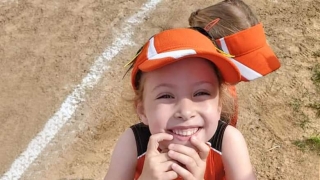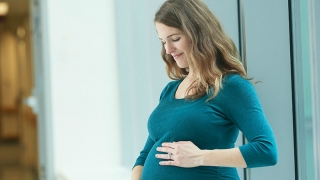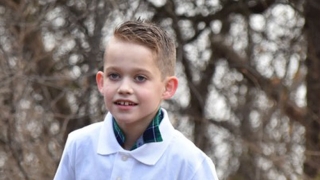The Garbose Family Special Delivery Unit (SDU) at Children's Hospital of Philadelphia (CHOP) was the first birthing unit of its kind, designed specifically to meet the special needs of families expecting babies with a prenatally diagnosed birth defect. The ability to provide comprehensive care in one location for mothers carrying a baby with a known birth defect helped to fulfill the mission of specialists at CHOP seeking to offer complete care for unborn patients.
Transcript
The Garbose Family Story
Lynne Garbose: My whole reality changed in the summer of 1988. I never looked at things the same way since. I was in my eighth month when I got information that the baby had a very rare and fatal heart defect.
Bill Garbose: I remember that when we found out the news about Emily, Emily's condition, that we were in a radiology office, and it really— it almost knocked me off my feet.
Lynne Garbose: She was going to need the highest level of intensive care immediately on birth, and that type of nursery needed to be at the pediatric institution in the city where we were living.
Bill Garbose: We knew that our baby probably was not going to live very long, and Lynn was half an hour across the city, and she was limited in her ability to be with the baby.
Lynne Garbose: It was very painful, being separated, having just given birth for the first time and then wanting to be with the baby and see the baby.
Bill Garbose: It made a stressful time many, many times more stressful.
Lynne Garbose: Knowing that you're going to have really limited time with your child, you know, is really difficult. And holding her and looking at her and—I kept searching her face, you know, who would you be? What would you become? What you have looked like? You know, just trying to pack a lifetime, you know, into the moments that I had with her.
Holly L. Hedrick, MD: Traditionally, clinical care at The Children's Hospital of Philadelphia had been from newborn into adulthood. And we've seen a significant shift in that paradigm in that now we are providing care prior to birth. We now have an unborn patient that we're caring for.
Thomas L. Spray, MD: Children with complex conditions in utero need to have specialized obstetrics, specialized delivery services, and often, intervention either in utero or immediately after birth.
Julie S. Moldenhauer, MD: An important component of providing care for the unborn patient is the ability to provide comprehensive obstetric services for a mother who's carrying a baby with a birth defect. The Special Delivery Unit at CHOP was the first unit of its kind to meet these very special needs.
Alan W. Flake, MD: The SDU has sort of been the ultimate fulfillment of our mission as a fetal treatment center.
N. Scott Adzick, MD: It's an alliance between the Center for Fetal Diagnosis and Treatment and the Fetal Heart Program at the Children's Hospital of Philadelphia.
Julie S. Moldenhauer, MD: Not only do we work very closely together, we are literally right next door to each other.
Denise D. Donaghue, RN: Half of the babies that are delivered there come to the Cardiac Intensive Care Unit, and the other half end up going to our Neonatal Intensive Care Unit.
Thomas L. Spray, MD: When you know about the defect and you know that something will need to be done right after birth, it makes sense for that baby to be where that care is going to be delivered.
Lynne Garbose: When we heard about the Special Delivery Unit, it was just something that we had to be involved with.
Joanna C. M. Cole, PhD: The Garbose Family Special Delivery Unit is the final piece in treating our families that come through the Center for Fetal Diagnosis and Treatment.
Meeting a Need
Lori J. Howell, RN: The Garbose Family Special Delivery Unit is a one-of-a-kind, first-in-the-world labor and delivery unit devoted exclusively to mothers of babies with birth defects.
Casey Kirsch: Bryan and I find out that we were expecting about three or four months after our wedding.
Bryan Kirsch: You know, told the family, everybody was excited. We were three months in. And then we had, you know, that day with the sonogram.
Casey Kirsch: Our son was to be born with a birth defect known as an omphalocele, which is an abdominal wall defect. And his liver, his spleen, his bowels, and his intestines were outside of his body cavity.
Bryan Kirsch: You're almost powerless. So what do you do as first time parents? You could only do the best what you could do, and the best was The Children's Hospital of Philadelphia.
Casey Kirsch: We were going to be able to have access to the most advanced care while I was still pregnant and then to be able to deliver at a state-of-the-art, you know, number one children's hospital in the nation and give our son the best chance at living a normal life from the beginning.
N. Scott Adzick, MD: Every family who has care in the Special Delivery Unit will find an environment that is incredibly supportive, where their questions are answered, where their needs, whether medical, physical, social, psychosocial, are met by an incredibly multidisciplinary and compassionate team.
Holly L. Hedrick, MD: The care for that baby starts, and that family, starts right from the beginning.
N. Scott Adzick, MD: Everything is brought to the family. Everything is brought to that pregnant mother with that unborn baby with a birth defect.
Jack Rychik, MD: The Special Delivery Unit offers an incredible advantage to fetuses who have the potential for having difficulties the moment they are born.
Alan W. Flake, MD: So it's really a comfortable situation for both, I think, the patients and the doctors.
Support from the Start
Joanna C. M. Cole, PhD: Upon referral to the Center for Fetal Diagnosis and Treatment, families are seen for a one-day comprehensive evaluation.
Alan W. Flake, MD: They get all of their imaging done in one day.
N. Scott Adzick, MD: Her ultrasound, her fetal echocardiogram, her ultrafast fetal MRI—
Joanna C. M. Cole, PhD: So at the end of the initial consultation day, families sit down with the multidisciplinary team, and they're given the confirmatory diagnosis of what's going on for their baby. And then they discuss treatment options so that they're able to go home, knowing that there's a plan.
Julie S. Moldenhauer, MD: We work really hard to create an individualized plan of care that best suits their needs and the needs of their baby.
Joanna C. M. Cole, PhD: And so our team really looks at families holistically, meaning how do we support not only mom's health, but how do we support the fetal health?
N. Scott Adzick, MD: We have, by far, the largest experience in the world with open fetal surgery. It's an operation not only for the fetus, who has everything to gain, but also for the mother, who's sort of medically an innocent bystander.
Julie S. Moldenhauer, MD: We felt that it was very important to bring a psychologist onto the team so that we had somebody available to these families for this journey where we knew that this was going to, you know, provoke stress. This was going to provoke anxiety.
Joanna C. M. Cole, PhD: It's quite unique that we have a psychosocial support team within a fetal center. We're not only focusing on mother's care and baby's care physically, but also emotionally, and looking at the context of the family when it comes to support persons, fathers, siblings, grandparents and the extended family.
One Team, One Location
Casey Kirsch: Having everyone here on the team here as a support system to hold you up is so critical because from the beginning, we felt like we were a team. Certainly, by no means are we doctors or nurses or medical professionals, but they took every effort, everyone on our team, to make us understand, in our own language, what we were going through and to make us feel like we were a part of all decisions.
Julie S. Moldenhauer, MD: What we're trying to do is to educate them about the diagnosis and prepare them for what their life and their child's life is going to look like, not only in the short term but in the long term, so that some of those fears and anxieties of the unknown we can put away for them. We want to talk about epidurals. We want to talk about pain management in labor. We want to talk about, you know, footprints at birth. We want to talk about weight. We want to talk about all of things that every other mom and dad talk about and try to take away the fear and the anxiety of the unknown related to the diagnosis in the baby.
Joanna C. M. Cole, PhD: So what makes the Special Delivery Unit unique is that we are treating adults within a pediatric institution. So the unit itself is very calming; it's very warm. The colors are picked on purpose to help families feel at peace when we come to deliver so that their experience of childbirth brings joy and security and comfort, despite the circumstances of having a baby with a fetal anomaly. The rooms in the Special Delivery Unit are able to accommodate family members to be able to visit. They're able to have siblings that come into the room to spend time with their parents, and that really helps families stay together during a really difficult time.
Denise D. Donaghue, RN: It's a huge benefit for mothers and fathers to be able to be geographically close to their babies.
Alan W. Flake, MD: As a pediatric surgeon, I often receive patients from other hospitals.
N. Scott Adzick, MD: And invariably, there's separation between the baby and the mother. The father can go back and forth; the mother is usually stuck at the referring hospital for a day or more.
Lynne Garbose: I was incredulous that I couldn't deliver at the children's hospital and that there would be two teams of doctors—
Holly L. Hedrick, MD: It doesn't matter whether you're a building away or five states away. You're separated from the baby.
Alan W. Flake, MD: And I think that's an awful experience for parents. And one of the real advantages of the SDU is that you're here with the baby.
N. Scott Adzick, MD: Optimal care involves the parents being able to participate from minute one.
Julie S. Moldenhauer, MD: Because of what we do and the very specialized nature of it, unfortunately many of our families are faced with making very difficult decisions.
Bill Garbose: We weren't sure whether Emily was going to survive birth. And she lived for three days, and we got to hold her, and we got to spend time with her. And it was a very, very special time.
Lynne Garbose: The pain, you know, of impending loss because I had the diagnosis was so profound.
Joanna C. M. Cole, PhD: Sometimes families come into the center, and they receive a diagnosis that may be not viable with life. And so that's when our Perinatal Palliative Care and Bereavement Program steps in to help support families with decision making around how they wish that birth to occur.
Julie S. Moldenhauer, MD: We want them to face the birth or however much time they're able to spend with their son or daughter with dignity and appreciate that time, whether it's their time that they get to spend together while the baby is still on the inside or if it's a few short minutes that the baby is with us here in the Special Delivery Unit.
Joanna C. M. Cole, PhD: So helping families being able to let go, being able to have families have closure and help them at the time of withdrawal is also really critical to the care that we provide.
Improving Outcomes
Joanna C. M. Cole, PhD: Having mom and baby together in the same place optimizes outcome and helps moms and families participate in care as soon as possible.
Casey Kirsch: Being able to deliver and have that moment immediately where I was able to see him, but knowing that he was medically stabilized and that there was a state-of-the-art operating room directly next to mine, is mind-blowing.
Julie S. Moldenhauer, MD: We are anticipating an improvement in their outcome because everything and everybody that they need are right there, available, from the time that they're born until the time they go home.
J. William Gaynor, MD: Having the SDU allows us to time their delivery, to know when they're going to be born, to have all the resources necessary there, even if it involves having another operating room set up.
Julie S. Moldenhauer, MD: Babies can be delivered in one room with a surgical team on standby in the adjacent room.
Holly L. Hedrick, MD: From the very beginning, everyone has planned on it, and the treatment starts that minute.
Julie S. Moldenhauer, MD: When you can go from one operating room to another through just a simple set of doors, it may make all the difference in the world to that child surviving or not surviving.
N. Scott Adzick, MD: When one has such an environment, it naturally attracts a world-class and worldwide talent pool that all sort of congeal to make the next cohort of advances.
Joanna C. M. Cole, PhD: There's no place in the world that is doing research in the area of psychiatric illness, mental health support, psychosocial services in a fetal center. And so it's really exciting to be the first.
Julie S. Moldenhauer, MD: We also have research that's going on in buildings across the street from the Special Delivery Unit where we can study the science of these particular birth defects and disorders.
Lynne Garbose: There's going to be a lot of learning in terms of the teamwork in dealing with essentially two patients but having one team.
Bryan Kirsch: People say all the time, you know, "What's Jackson like now? Can he do everything that normal kids do?" And it's like nothing ever happened—smart, funny, loving, concerned, all of everything you want in a two-year-old.
Casey Kirsch: He's got such a zest for life. And here we are, two years later, after many challenging moments, but just having the pleasure of watching our beautiful two-year-old baby boy run circles around us.
Jack Rychik, MD: The Special Delivery Unit allows us to be able to do things that no other place anywhere in the world can do.
Julie S. Moldenhauer, MD: To handle any situation that might arise with a newborn—
Jack Rychik, MD: To study some of the aspects of delivery that are unique to babies with birth defects—
Julie S. Moldenhauer, MD: To answer questions that are yet unknown and hopefully provide the best care and outcomes possible to these children and families.
Related Centers and Programs: Richard D. Wood Jr. Center for Fetal Diagnosis and Treatment, Garbose Family Special Delivery Unit


